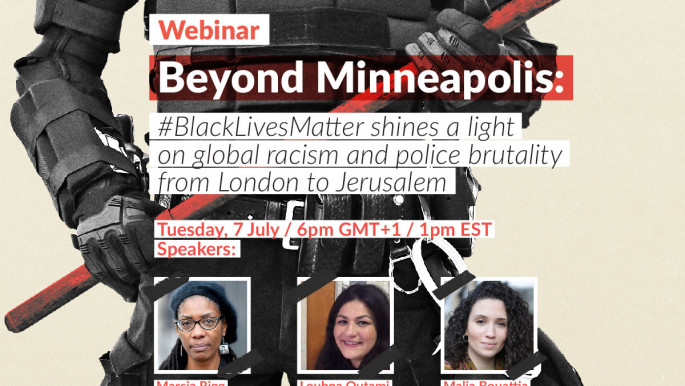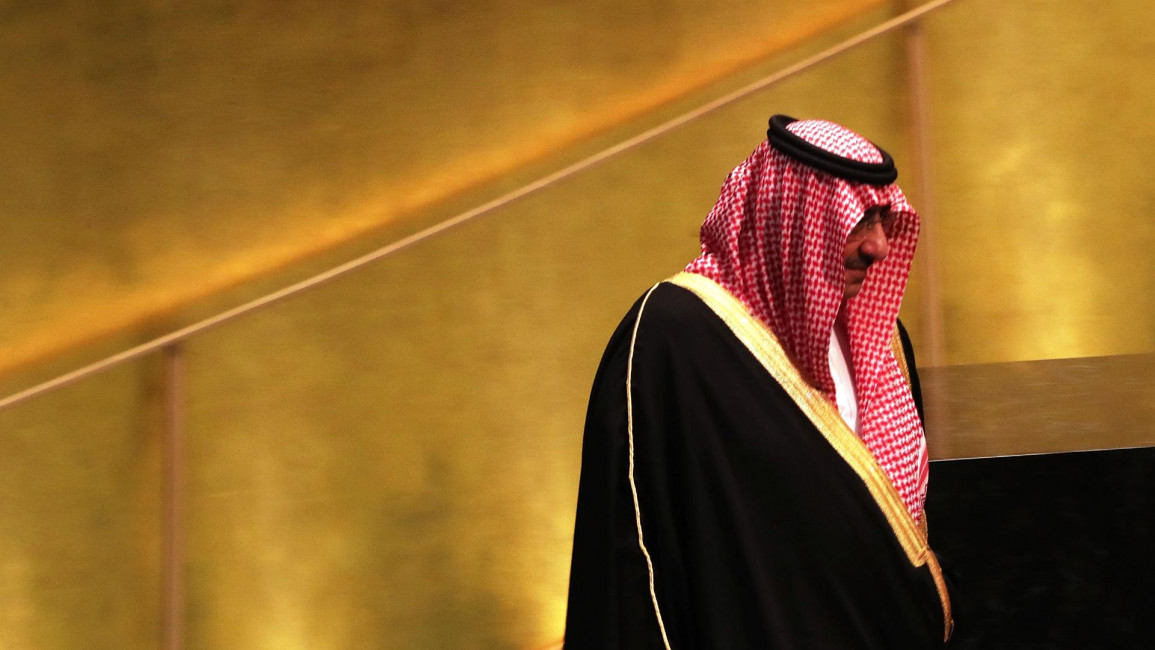Saudi crown prince seeking $15 billion from rival cousin Mohammed bin Nayef in 'shakedown'
Saudi crown prince seeking $15 billion from rival cousin Mohammed bin Nayef in 'shakedown'
Saudi prince Mohammed bin Nayef, jailed earlier this year, is facing major corruption charges.
4 min read
Bin Nayef was arrested in March this year and accused of plotting a coup [Getty]
Saudi authorities are demanding a $15 billion settlement from detained former crown prince Mohammed bin Nayef, The Washington Post reported on Sunday.
Bin Nayef was jailed earlier this year by his successor and former rival, Mohammed bin Salman. He now faces major corruption and disloyalty charges, sources close to the royal family say.
Widely known as MbS, the current crown prince has become the defacto ruler of the ultraconservative kingdom after eliminating potential rivals in so-called anti-corruption crackdowns three years ago.
An anti-corruption committee is being set up and tasked with investigating bin Nayef's activities to prepate charges against the former crown prince, Saudi and US sources told The Washington Post.
Saudi investigators allege that bin Nayef siphoned off billions of Saudi riyals through a number of front companies and private accounts, as he led counter-terrorism programmes at the interior ministry.
Bin Nayef served as chief assistant to his father, then-Interior Minister Prince Nayef, as Washington's pointman in the fight against Islamist extremist and leading the kingdom's crackdown on Al-Qaeda.
He later took up his father's mantle, serving as interior minister between 2012 and 2017.
Authorities have demanded the former interior minister and crown prince repay $15 billion they claim he stole, an associate of bin Nayef said.
Friends of the prince have contested these charges saying his activities at the ministry were authorised by a 2007 royal decree.
Read more: Detained Saudi official's children were 'first victims' of MbS, brother claims
Bin Nayef was jailed earlier this year by his successor and former rival, Mohammed bin Salman. He now faces major corruption and disloyalty charges, sources close to the royal family say.
Widely known as MbS, the current crown prince has become the defacto ruler of the ultraconservative kingdom after eliminating potential rivals in so-called anti-corruption crackdowns three years ago.
An anti-corruption committee is being set up and tasked with investigating bin Nayef's activities to prepate charges against the former crown prince, Saudi and US sources told The Washington Post.
Saudi investigators allege that bin Nayef siphoned off billions of Saudi riyals through a number of front companies and private accounts, as he led counter-terrorism programmes at the interior ministry.
Bin Nayef served as chief assistant to his father, then-Interior Minister Prince Nayef, as Washington's pointman in the fight against Islamist extremist and leading the kingdom's crackdown on Al-Qaeda.
 |
| Click to register now - webinar tomorrow! |
Authorities have demanded the former interior minister and crown prince repay $15 billion they claim he stole, an associate of bin Nayef said.
Friends of the prince have contested these charges saying his activities at the ministry were authorised by a 2007 royal decree.
Read more: Detained Saudi official's children were 'first victims' of MbS, brother claims
The decree, signed by then-King Abdullah and seen by The Washington Post, references a secret fund managed by bin Nayef and authorises him to create "appropriate vehicles in the private sector" to disguise sensitive counter-terrorism efforts.
It also states bin Nayef was to "brief us at the end of every fiscal year" about spending from the fund and approves all previous counter-terrorism spending.
|
|
A 2013 spending report reviewed by The Washington Post shows requests to spend 5 billion riyals ($1.3 billion) had been approved by Khaled Al-Tuwaijri, the chief of the royal court.
Former CIA officials said they were aware of bin Nayef's control over such a secret counter-terrorism fund at the time and used the accounts to help finance joint US-Saudi projects.
In a document seen by The Washington Post, bin Nayef told his aides that by creating a network of cover companies, he was "emulating the standard followed by international security agencies".
A major difference in this from Western standards was that two aides managing the network were promised five percent of the companies' annual profits as compensation.
"The interior ministry was provided with a budget so they could build up capabilities, recruit personnel and develop intelligence service contacts to penetrate Al-Qaeda," former CIA director John Brennan told The Washington Post. "[King] Abdullah's view was that he had to be invested in the activities that [bin Nayef] was leading. [Bin Nayef] was one of his favourites."
"Over the course of my interaction with [bin Nayef], he wasn't someone I thought was engaged in corrupt activity or was siphoning off money," added Brennan, who worked closely with the former crown prince for more than a decade.
A former senior US official stationed in Riyadh added: "Everybody in the US government understood that [bin Nayef] had the broadest spending authority from the king."
In 2015, at the same time bin Nayef was named crown prince following the death of King Abdullah, MbS was designated deputy crown prince.
Associates say bin Nayef understood that his privileged and trusted position under the former king had ended and he began liquidating the secret network of front companies, transferring their ownership to the Saudi Public Investment Fund, the country's sovereign wealth fund.
In 2017, bin Nayef was summoned by his deputy, MbS, and told to resign. With his rival backed by prominent princes, bin Nayef submitted and swore allegiance to MbS.
Over time, the former crown prince was subjected to further pressure from MbS. His wife and daughters were banned from travelling abroad, and authorities seized more than $5 billion of his family's assets.
Finally, he was arrested in March this year along with his uncle, Prince Ahmed, accused of plotting a coup.
In May, Saudi Arabia's Prisons Authority tweeted that bin Nayef was hospitalised after "suffering a heart attack".
The post was later removed and replaced by a tweet stating the security of the Prison Authority's account had been breached, suggesting a hack.
Follow us on Facebook, Twitter and Instagram to stay connected



